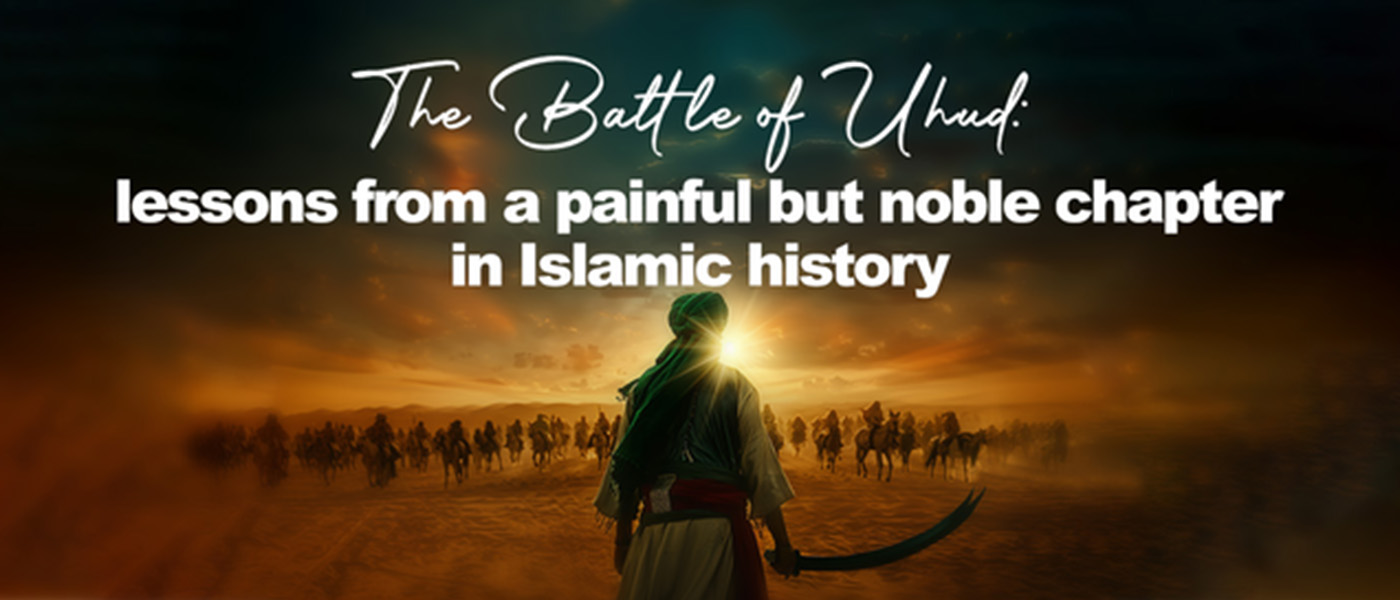
The battle of Uhud is one of the most profound events in the seerah (biography) of our beloved Prophet Muhammad (SAW). Taking place in the third year after hijrah, this pivotal battle tested the resolve, faith, and unity of the early Muslim community. While it was a battle that ended in hardship for the Muslims, it brought forth timeless lessons that continue to inspire and instruct believers until today.
After the Muslims’ decisive victory at the Battle of Badr, the Quraysh of Makkah were burning with desire for revenge. They could not accept the defeat and humiliation at the hands of a community they once deemed weak. Thus, in Shawwal 3 AH, the Quraysh marched towards Madinah with an army of approximately 3,000 men, led by Abu Sufyan.
The Prophet (SAW) consulted with his companions about how to face the threat. While he initially inclined toward staying within the city of Madinah, many young companions, inspired by the victory at Badr, urged to meet the enemy outside. The Prophet (SAW) accepted their view and marched with about 1,000 companions towards the area of Mount Uhud.
As the army reached Uhud, a hypocrite by the name of Abdullah ibn Ubayy withdrew with 300 of his men, weakening the Muslim forces to only 700. Despite this, the Prophet (SAW) strategically positioned a group of skilled archers under the command of Abdullah ibn Jubayr on a small hill to protect the Muslim army from a flank attack. He gave them firm instructions, “Even if you see that vultures are tearing away at our remains, do not move from this place until you receive an order from me.”
Initially, the Muslims were successful and began pushing back against the Quraysh. However, seeing the enemy retreat, many of the archers assumed the battle was over and left their post to gather their spoils. This critical mistake opened the path for a cavalry attack from behind, led by Khalid ibn Al-Walid (who had not yet embraced Islam). The tide of the battle turned, and the Muslims faced a devastating counterattack.
During this confusion, the Prophet (SAW) was injured. He fell into a pit, bled from his face, and one of his teeth was broken. Despite this, he stood firm, calling his companions to rally around him. His bravery in this moment was unparalleled. The Prophet (SAW) said, “How can a nation be successful when they have injured their own Prophet?” (Sahih al-Bukhari)
Then, Allah (SWT) revealed, “You O Prophet have no say in the matter. It is up to Allah to turn to them in mercy or punish them, for indeed they are wrongdoers.” (The Clear Quran®, 3:128)
70 noble companions were martyred in this battle, including the beloved uncle of the Prophet, Hamzah ibn Abdul Muttalib. His body was mutilated by Hind bint Utbah in an act of vengeance. The Prophet (SAW) was heartbroken, and he stood by his uncle’s body with tears in his eyes.
Another painful moment came when it was rumored that the Prophet (SAW) had been killed. Panic spread among the Muslims, and many fled, while others continued to fight with renewed courage. When the truth was known, the remaining Muslims regrouped and held their ground.
The Battle of Uhud is not to be taken as just a simple military engagement. Allah (SWT) revealed several verses in Surah Ali Imran reflecting on the battle, comforting the believers, correcting their errors, and drawing spiritual lessons.
He says, “If you have suffered injuries at Uhud, they suffered similarly at Badr. We alternate these days of victory and defeat among people so that Allah may reveal the true believers, choose martyrs from among you—and Allah does not like the wrongdoers—.” (The Clear Quran®, 3:140)
This verse reminds us that victory and loss are both part of Allah (SWT)’s divine wisdom—not just worldly outcomes, but means for testing and purifying the believers.
Here are some lessons to take away from the Battle of Uhud that you can apply in your daily life:
- Obedience to the Prophet (SAW) is critical: The downfall at Uhud began when someone disobeyed the Prophet (SAW)’s command. This is a direct reminder that success is in following the Sunnah, not personal judgement.
- Unity is a source of strength: Internal divisions can bring about great harm. The withdrawal of hypocrites and the breakdown of coordination had consequences for the entire Ummah.
- True victory lies in steadfast faith: Even in what seemed a defeat, Allah (SWT) honored the martyrs and taught the Ummah priceless lessons. The test of Uhud elevated the sincere believers.
- The Prophet (SAW) is our ultimate example of sabr and leadership: His courage, forgiveness, and unwavering trust in Allah (SWT) during the darkest moments are unmatched.
The Battle of Uhud was a painful moment for the Muslim community, but it was not a failure. Rather, it was a divine lesson in discipline, loyalty, and perseverance. It reminded the believers that ultimate victory is not defined by worldly triumph, but by faith, sincerity, and steadfastness.
Let us honor the memory of those noble companions who gave their lives at Uhud by striving to embody their sincerity, obedience, and unwavering love for the Prophet (SAW).
May Allah (SWT) allow us to learn from their example and grant us the honor of being united with them in the highest ranks of Jannah, Ameen!



